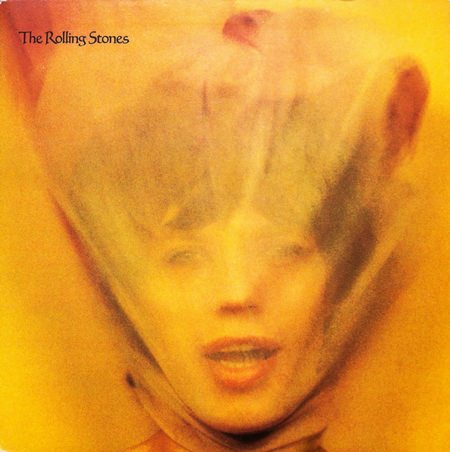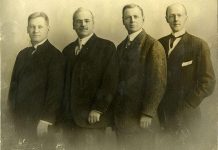
The Rolling Stones: Goat’s Head Soup (Rolling Stones Records)
Of course I had to wait until the Stones had reached their zenith and were slowly starting to roll downhill before I went to see them for the first time: Gothenburg, 1973. The circus was in town. Decadence had replaced hunger, they were loaded and delivered kitsch rather than inspired greatness. It would get worse, but at the time they looked impressive, stadium rock was still a new thing. Lots of lights and colours, lots of everything, lavish, spectacular, Mick jumping all over the stage, posing, hips shaking, the professional show band flirting with its own myth.
I felt cheated. I had come too late. Why didn’t I see them in ’65 when they played in Oslo?
“Goat’s Head Soup” was the first Stones album I got for free. The first Stones album I related to as a critic. Unfortunately it was also the Stones album where the band had lost the plot. In retrospect it appears they weren’t too happy with it themselves either. They had left something of themselves in the dark, feverish beast called “Exile On Main St.” That album drained them, they would never reach similar peaks again.
Compared to most of what came after, “Goat’s Head Soup” isn’t that bad actually. Their fangs are still showing, and on occasions, though not very often unfortunately, they do ignite.
The album was recorded in Jamaica. They wanted a change of scenery, and Jamaica was one of the few places on Earth where immigration would not block Keith Richards’ entry. In other words, they picked Jamaica not because of its music and culture, but because of its liberal passport control.
Of course you can’t record in Jamaica without being influenced by its lively music scene, and in 1972/73 Kingston sure was cooking. In that respect “Goat’s Head Soup” is a missed opportunity as the few “Jamaican” ingredients they sprinkle over their stew is as close to the real thing as the contemporary James Bond-movie “Live And Let Die” was. The picture of the goat’s head soup found inside the sleeve and the sticky flirt with the devil, “Dancing With Mr. D”, is Samedi and Kananga for rock’n’roll heads.
“Goat’s Head Soup” is a slow moving and strangely uninspired album. Keith Richards later claimed that they hired session musicians that were so good that the Stones willingly let themselves be relegated to the back seat. He also thought that Mick Taylor was completely wrong for the group, they did not need a solo guitarist, they needed a guitar player. Full stop.
Maybe he had a point. If you put on a Stones-album you’d much rather hear Keith’s trademark rhythm rattle, both biting and loose, than being invited to sit down and marvel at exquisite saxophone playing and Billy Preston’s fusion dance on the keyboards.
Regarding Keith’s opinions on Taylor I am more uncertain, for it is the very same Taylor who owns the incredibly beautifully arranged “Winter”, the best track on the album by far, and Keith isn’t even on it.
Mentioning strong tracks we should of course include “Angie”, a stunning ballad that is so familiar by now that half the world can sing it. Unfortunately Jagger’s original guide vocal was not removed, it is left in there as a disturbing ghost-like holler behind the main vocal. The moment you become aware of this the listening experience can be quite unnerving, particularly in headphones.
The third winner on the album is the evocative and quiet “Coming Down Again”, sung by Keith (sometimes duetting with Mick ) with burning fervor, it is right up there among his best vocal performances ever.
Apart from these I see no real winners. The closest thing is “Hide Your Love “, a piano blues from the basement with a crackling guitar-run and a tight, buttoned up Charlie. It sounds like an outtake from “Exile On Main St.”, but doesn’t sit well with the other tracks on “Goat ‘s Head Soup”.
“Doo Doo Doo Doo Doo (Heartbreaker)” is a punchy groover, dressed up in sweeping horn blasts, but it loses steam fast and reveals itself to be a fairly average song, and Jagger’s verbal posing doesn’t exactly help.
“100 Years Ago” never quite knows what it wants, landing flat-footed on some sort of funky solution that fortunately is rescued by a savage guitar solo.
“Dancing With Mr. D” is all posturing and no tune, so sticky it hardly moves at all, rotating around its own axis on a Keith-riff that could have gone places, but doesn’t.
“Star Star” sounds like the archetypal Stones rocker, Chuck Berry-riffs galore, but is dragged down by a “see how naughty we are”-lyric that is no more than hollow satire. Stones rock’n’roll by the numbers.
“Silver Train” tries too hard, is sadly unrealized, burdened with weak riffs and a desperate excuse for a melody. An outtake from 1970 that should have remained in the vaults, but ended up as a double A-side with “Angie”. Now what was that all about?
Remaining is the dreadful funk jam “Can You Hear The Music”, a pale relative of the spirited and highly successful “Can’t You Hear Me Knocking” on “Sticky Fingers”. Awful.
“Winter” is the one that almost justifies the album’s existence alone. The Rolling Stones did not record many classics after “Exile”, but this is one of them. The mantra-like coda with the “Moonlight Mile” string arrangement and the phenomenal Mick Taylor solo is not of this world. “Winter” deserves its place on any “Best Of” by The Rolling Stones.
The lack of strong up-tempo tracks on the album is a mystery. The majority of the quality cuts they recorded were all quiet and melodic. In fact they couldn’t fit them all in, so some had to go. Two of them, “Through The Lonely Nights” and “Waiting On A Friend”, both better than anything that rocks on the album, re-appeared as a B-side (in 1974) and a key track on “Tattoo You” (in 1981).
Released: August 31, 1973
Produced By: Jimmy Miller
(All songs by Mick Jagger and Keith Richards)
Side One
1. “Dancing with Mr. D” 4:53
2. “100 Years Ago” 3:59
3. “Coming Down Again” 5:54
4. “Doo Doo Doo Doo Doo (Heartbreaker)” 3:26
5. “Angie” 4:33
Side Two
6. “Silver Train” 4:27
7. “Hide Your Love” 4:12
8. “Winter” 5:30
9. “Can You Hear the Music” 5:31
10. “Star Star” 4:25
The Rolling Stones:
Mick Jagger – lead and backing vocals, electric guitar on “Winter”, harmonica on “Silver Train”, piano on “Hide Your Love”
Keith Richards – electric and acoustic guitar, backing vocals, lead vocals on “Coming Down Again”, bass guitar on “Doo Doo Doo Doo Doo (Heartbreaker)” and “Silver Train”
Mick Taylor – electric, acoustic and slide guitar, bass guitar on “Dancing with Mr. D” and “Coming Down Again”, backing vocals
Charlie Watts – drums
Bill Wyman – bass guitar
Additional Personnel:
Nicky Hopkins – piano on “Dancing with Mr. D”, “100 Years Ago”, “Coming Down Again”, “Angie”, “Winter”, and “Can You Hear the Music”
Billy Preston – clavinet on “100 Years Ago”, piano on “Doo Doo Doo Doo Doo (Heartbreaker)”
Ian Stewart – piano on “Silver Train” and “Star Star”
Bobby Keys – tenor and baritone saxophone
Jim Horn – flute and alto saxophone
Chuck Findley – trumpet
Jim Price – horn arrangement on “Doo Doo Doo Doo Doo (Heartbreaker)”
Nicky Harrison – string arrangement on “Angie” and “Winter”
Anthony “Rebop” Kwaku Baah – percussion on “Dancing with Mr. D” and “Can You Hear the Music”
Pascal (Nicholas Pascal Raicevic) – percussion on “Dancing with Mr. D” and “Can You Hear the Music”
Jimmy Miller – percussion on “Can You Hear the Music”
Chief engineer – Andy Johns (who also mixed the album)
Assistant engineers – Carlton Lee, Howard Kilgour and Doug Bennett
Photography and sleeve design by David Bailey
Recorded:
25 November – 21 December 1972 and 23 May – 20 June 1973, Dynamic Sound Studio, Kingston, Jamaica, except “Hide Your Love”, recorded at De Doelen, Rotterdam, Netherlands, Summer 1973.
 |
 |
 |





